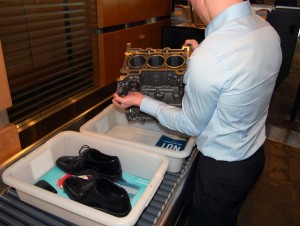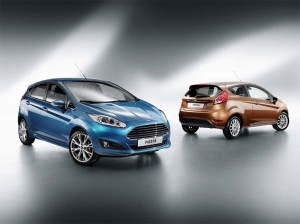
The block for the new 1.0-liter EcoBoost engine is small enough to fit in a carry-on bag -- and is shown here going through airport security.
Ford will begin offering a new 1.0-liter, 3-cylinder version of its turbocharged EcoBoost powertrain family on the updated Fiesta subcompact next year, and though it has not worked up final numbers for the fuel-efficient option, a senior company official promised it will yield in excess of 40 miles per gallon.
“We’re forecasting it will deliver higher mileage than any non-hybrid car from any of our competitors,” said Bob Fascetti, director of global engine operations for Ford, during a Monday news conference.
Ford has launched an aggressive push to position itself as the greenest of automakers, a significant challenge considering the market perception of arch-rival Toyota – which happens to market the world’s most popular hybrid vehicle, the Prius. But Ford has been rolling out an array of conventional hybrids and battery-electric vehicles, with two plug-in hybrids, the Fusion Energi and C-Max Energi, due to debut at the LA Auto Show later this month.
Meanwhile, the maker has continued gaining ground with its high-tech EcoBoost line-up. Currently, there are three versions of the turbocharged family available in the U.S., a 1.6-liter inline-four, a 2.0-liter I-4, and a 3.5-liter V-6. The latter engine now accounts for 42% of Ford F-Series pickup sales, an option rate that has surprised even senior company officials.
“The old saying that there’s no replacement for displacement is now obsolete,” proclaimed Fascetti.
Since launching the EcoBoost technology in mid-2009, Ford has sold over 520,000 of the engines worldwide and demand for 2012 is expected to come in at more than 270,000 according to Fascetti. By the end of 2013, Ford hopes to have sold 1.3 million EcoBoost-equipped vehicles worldwide. By then, the various versions will be available in 90% of Ford’s North American line-up.
With an average 20% improvement in fuel economy compared to similarly sized gasoline engines, Ford has found the EcoBoost a viable alternative to both diesel and, in some cases, hybrid technology. EcoBoost power replaced the hybrid option when Ford launched its all-new Escape crossover earlier in 2012.
The new version of the powertrain will, at least for now, be imported from Ford’s engine plant in Cologne, Germany, though it would be possible to shift production to the U.S. with strong enough demand – avoiding the penalty of shipping costs and a lopsided dollar/Euro exchange rate.
While fuel economy is clearly going to be a major selling point, the new 1.0-liter EcoBoost engine will also deliver significantly more power — 123 horsepower and 148 lb-ft of torque — than the Fiesta’s standard-issue 1.6-liter I-4 which makes 120 hp and 112 lb-ft. The normally aspirated engine yields 29 mpg City, 39 Highway and 33 Combined. To beat the best non-hybrid models now on the market, the three-cylinder EcoBoost would have to increase that number by perhaps 20% or more.
Some consumers may be initially wary of the small-displacement engine – and the historical record shows that traditional I-3 designs have had a variety of problems with noise, harshness and reliability. Ford has taken a number of steps to improve the 1.0-liter EcoBoost on all counts, while also effectively eliminating other issues, such as lag, normally found with turbocharged engines.
The new engine uses a small but fast-spinning turbo that is closely coupled to the exhaust manifold. It’s exhaust gases that “spool up,” or spin a turbo, so the faster pressure builds the less lag there is upon launch from a standing start.
Where prior three-cylinder engines were usually equipped with complex and heavy balance shafts, Ford has adopted an off-balance flywheel and pulley to effectively neutralize the shake and noise inherent in powertrains with an odd number of cylinders.
Noise levels were further reduced by using a rubberized drive belt, rather than a metal chain, and passing it through an oil reservoir.
While the new 1.0-liter engine is the smallest of the EcoBoost family, it is also the most sophisticated, according to Fascetti, who suggested that “As we upgrade the other EcoBoost engines we’ll adopt some of the same technologies.”
The 1.0-liter EcoBoost will become available in mid-2013 on the 2014 model-year Ford Fiesta subcompact. Officials hinted it will likely carry a premium over the larger but less technically sophisticated 1.4-liter I-4 – as do other versions of the EcoBoost line-up offered in other Ford products.

